|
|
|
Sort Order |
|
|
|
Items / Page
|
|
|
|
|
|
|
| Srl | Item |
| 1 |
ID:
099483
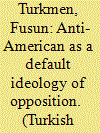

|
|
|
|
|
| Publication |
2010.
|
| Summary/Abstract |
Contemporary anti-Americanism is as much based upon a backlash against globalization and an antithesis to the values generated and exported by American culture as on specific episodes of contention between the US and another collective actor, altering the nature of their relationship in the long run by determining the subsequent behavior of the politically dominant actors as they remain engraved in collective memory. On the basis of this assumption and following an overview on anti-Americanism as a phenomenon, this essay analyzes the recurrent anti-Americanism in Turkey, identifying its external and internal sources-that is, episodes of contention and other factors such as ideology, nationalism and the role of the media-as well as its consequences, before replacing it within the typology elaborated by Peter J. Katzenstein and Robert O. Keohane on various anti-Americanisms.
|
|
|
|
|
|
|
|
|
|
|
|
|
|
|
|
| 2 |
ID:
099490
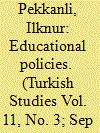

|
|
|
|
|
| Publication |
2010.
|
| Summary/Abstract |
e aim of the study is to investigate the current situation of language testing in Turkish public high schools through test development and grading procedures as well as examining the potential benefits through the implementation of the CEFR and non-traditional assessment procedures.
|
|
|
|
|
|
|
|
|
|
|
|
|
|
|
|
| 3 |
ID:
099491


|
|
|
|
|
| Publication |
2010.
|
| Summary/Abstract |
In divided Cyprus, there are two separate tourism markets, one in the Greek Cypriot South and one in the Turkish Cypriot North. This is a costly reality of the Cyprus problem. The purpose of this paper is to determine the potential "peace dividend", called efficiency gains, generated by a possible settlement of this problem as a result of an agreement between the two major communities on the island. Based on a survey of primary stakeholders in both parts of the island, the study finds persuasive empirical evidence of significant efficiency gains. However, this optimistic finding is limited by the politics of division which appear to dominate economic rationalism.
|
|
|
|
|
|
|
|
|
|
|
|
|
|
|
|
| 4 |
ID:
099489


|
|
|
|
|
| Publication |
2010.
|
| Summary/Abstract |
This article critically evaluates the writings of two well-known intellectuals, Ismay?l Hakk? Baltac?ogbrevelu (1886-1978) and Vacirclacirc Nureddin (Vacirc-Nucirc) (1901-1967), and seeks to assess the implications of social constructionism and biological essentialism for the formation of Republican woman's identity as presented in the works of these authors respectively. The central aim of the article is to reveal and re-appraise the patriarchal mentality underlying Turkish political and social thought by examining the connections between social constructionism and essentialism, as two main factors reinforcing gender inequality in the context of Turkish modernization and the nation-building process. Firstly, it is argued that the works of both authors reflect the dominant gender structure in Turkey, grounded on the subordinate position of women. Despite their divergent positions, neither of the authors provides openings for gender equality. Baltac?ogbrevelu advocates social constructionism emphasizing the socio-cultural at the expense of the natural during the identity formation process while Nureddin supports a biologically essentialist world view based on the "allotted" nature of the female. Baltac?ogbrevelu's social constructionism leads to gender (in)equality based on "sameness," within the contours of the public life whereas biological essentialism of Vacirc-Nucirc, signifies an ontological rejection of gender equality. Secondly, it is argued that both of the authors adopt a functionalist perspective emphasizing the reproductive function of women for men, family and nation and approach the issue of woman's identity within framework of the tradition-modernity continuum.
|
|
|
|
|
|
|
|
|
|
|
|
|
|
|
|
| 5 |
ID:
099487
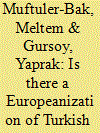

|
|
|
|
|
| Publication |
2010.
|
| Summary/Abstract |
The beginning of Turkey's accession negotiations with the European Union on October 3, 2005 constituted an important turning point for Turkey's relations with the EU and for Turkish socio-political transformation. This paper poses the following questions: (i) Is there a Europeanization of Turkish foreign policy as a result of Turkey's accession negotiations with the EU? (ii) If so, then what are the main areas and limits in which Europeanization of Turkish foreign policy has occurred? This paper answers these questions by providing a background of Europeanization; first by differentiating between the member states and the candidate countries; second by analyzing the Europeanization of Turkish foreign policy through an investigation of the changes in Turkish foreign policy since 1999 with regards to the Common Foreign and Security Policy (CFSP), NATO-EU cooperation and Turkey's Middle Eastern neighbors.
|
|
|
|
|
|
|
|
|
|
|
|
|
|
|
|
| 6 |
ID:
099484
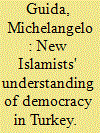

|
|
|
|
|
| Publication |
2010.
|
| Summary/Abstract |
Even though reaching a conclusive point seems impossible, debate on the relation between Islam and democracy is one of the most foundational discussions in politics today. Turkey is frequently seen as a positive example demonstrating the compatibility between Islam and democracy. Especially after the democratic reforms undertaken by the Islamist Prime Minister Recep Tayy?p Erdogbrevean and his effective governance. Erdogbrevean's party, the Justice and Development Party, seems to represent the Turkish Islamist intellectuals' political response to international and internal pressure toward democracy. Although it is true that the majority of contemporary Turkish Islamists have accepted liberal democracy, their devotion to its values has only been in form of a very pragmatic and functional approach rather than a true commitment to democracy.
This paper will briefly focus on the international and internal pressures on conservative intellectuals toward democracy. More extensively, Ali Bulaccedil and Hayreddin Karaman, two living Islamist authors, their intellectual careers, interpretations of democracy and their problematic approach to democracy will be thoroughly discussed. The two authors defend democracy and civil rights. However, democracy is only taken as a set of representative institutions and a free electoral system, and not pluralism, civility and tolerance. Yet at the same time, it is this contradiction that has been one of the major obstacles to the development of a true democracy in Turkey.
|
|
|
|
|
|
|
|
|
|
|
|
|
|
|
|
| 7 |
ID:
099482


|
|
|
|
|
| Publication |
2010.
|
| Summary/Abstract |
his study is a political historical account of the significance of the Turkish Labor Party (TLP) (Tuumlrkiye Idotscedilccedili Partisi) in Turkish politics and among the Turkish left in light of the party's parliamentary experience between 1965 and 1969. The TLP's entrance into the National Assembly was an important milestone and a unique phenomenon in modern Turkish politics. The TLP's insistence on the use of parliamentary and constitutional means to come to power was its distinctive feature; and it was this characteristic that distinguished the party from other main organizations and movements of the Turkish left in the 1960s.
|
|
|
|
|
|
|
|
|
|
|
|
|
|
|
|
| 8 |
ID:
099488


|
|
|
|
|
| Publication |
2010.
|
| Summary/Abstract |
Influenced by international donors and policy institutions, civic activism in Turkey has increasingly become synonymous with carrying out projects. Project culture is reshaping what civil society is, and what civic activism means. By showing how civil society is changing due to the integration of Turkey with the outside world, particularly with the EU, this article aims to move beyond the prevalent approaches to the study of Turkey-EU relations, which emphasize macro-policy issues and most often discuss pros and cons regarding Turkish EU-membership or evaluate how far Turkey is from fulfilling various criteria. Instead, this paper argues for an increased focus on how Turkey-EU relations reshape Turkish political culture.
|
|
|
|
|
|
|
|
|
|
|
|
|
|
|
|
| 9 |
ID:
099486
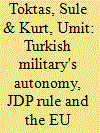

|
|
|
|
|
| Publication |
2010.
|
| Summary/Abstract |
This article tackles the question of Europeanization in Turkey's civil-military relations and the extent to which the EU has served as an anchor in the civilian control over the Turkish Armed Forces. We argue that the EU membership process has necessitated democratization in civil-military relations; EU support was not sufficient for fully integrated democratic control of the armed forces (DECAF) as there are still problems in the democratization of civil-military relations. Since the 2000s, there has been a DECAF reform process taking place but due to historical deficiencies in Turkish polity, like the civilian incapacity to change the priority given to the military's role in the making of the security culture, the European norms of DECAF, such as a constitutional division between the civilian and military authorities, political neutrality of the military and parliamentary control of the defense budget, is formal. In the first part, we aim to give background information to DECAF reforms in Turkey. The second part discusses Justice and Development Party (JDP)-Turkish General Staff (TGS) relations between 2002 and 2007. The third part assesses civil-military relations in the period since 2007. The last section pays special attention to the significance of the question of a Turkish way to Europeanization especially in the field of civil- military relations.
|
|
|
|
|
|
|
|
|
|
|
|
|
|
|
|
| 10 |
ID:
099485


|
|
|
|
|
| Publication |
2010.
|
| Summary/Abstract |
Notwithstanding the troubled past and uncertain future of its relations with the European Union (EU), Turkey persists in its bid for membership in the EU. What accounts for Turkey's continuing pursuit of EU membership? We argue that the historical and institutional trend of modernization has locked Turkey into a pattern of domestic and foreign policies which is difficult, if not impossible, for current policymakers to break or reverse. As part of its modernization process, Turkey chose to follow a Western-oriented foreign policy, which became entrenched during the Cold War era with increasing returns or positive feedback from its overall engagement with the West and Europe in particular. Hence, the policy choices of Turkish policymakers about the EU are constrained by historical and institutional factors.
|
|
|
|
|
|
|
|
|
|
|
|
|
|
|
|
|
|
|
|
|